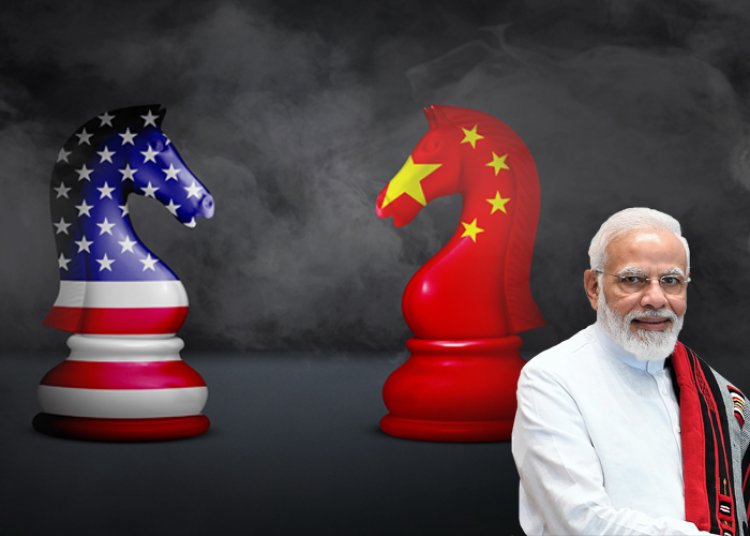China-US trade conflict and India
Explore how the China-US trade conflict influences India's economy. Learn about its implications, potential benefits, and challenges.

China-US trade conflict and India
Gold, silver, and shells were once traded. This educated several groups. The Silk Road was a major commerce route from Asia to Europe. Countries still trade for clothes and toys, which boosts their economies. Commerce enables people around the world to exchange goods.
Humanity has relied on trade for generations. Mesopotamian civilizations around the Tigris and Euphrates began trading in 3000 BCE. Ancient traders trading gold, silver, and shells. Trade has shaped human history since antiquity.
The Silk Road revolutionized trade. The second-century BCE Asian-European commerce network was one of the largest premodern trading systems. This system allowed merchants and explorers to trade commodities and transfer knowledge from China and India to Europe and the Middle East. Trade and cultural contacts along the Silk Road, which lasted until the 15th century, helped civilization evolve.
Trade continues to shape global economic development, politics, and social standards. Trade generates cash for many nations and provides needed commodities and services. Global trade exchanges products, services, and information, and nations today depend on each other for scarce resources. Today, commerce shapes economies and global conversation.
Antiquity's trade
Sumerians, Babylonians, Assyrians, Egyptians, and Phoenicians lived long ago. They made global trade possible. Traded spices, metals, and textiles. Egyptians were good traders because they lived near a great river. Phoenicians traded using coinage early. Ancient civilizations gave us trade!
Ancient civilizations shaped global trade. Trade began with the Mesopotamian Sumerians in approximately 3000 BC. They traded spices, textiles, metals, and other items with neighbors. Babylonian and Assyrian commerce routes followed.
Ancient Egyptians also helped trade expand. Their extensive commercial network covered Africa, Europe, and Asia. Egypt's proximity to the Nile River made trade easier.
Phoenicians also shaped ancient trade. Their Mediterranean-to-Atlantic maritime commercial network was one of the first. They also pioneered commercial coinage, which changed global trade. Trade has always been essential to human contact.
Sumerians, Babylonians, Assyrians, Egyptians, and Phoenicians helped trade grow. They improved ancient trade, creating the groundwork for modern trade.
Silk Road
The Silk Road formerly connected Asia. It helped people exchange expensive silk, spices, tea, ideas, and religions. The Silk Road introduced cultures and forged new alliances among kingdoms. The Silk Road, which is no longer used, shaped our world.
Trade history spans centuries and cultures, civilizations, and continents. The Silk Road is one of the most famous trading routes in history. The Silk Road, built in 206 BC by the Han Dynasty of China, united eastern and western Asia for the commerce of goods, ideas, and technologies.
Silk, the main product trafficked on the Silk Road, gave it its name. Silk was a luxury, but the route had other lucrative trades. Spices, tea, silk, ivory, and gemstones were also prized. The Silk Road was a busy marketplace that helped spread Buddhism and Islam and build diplomatic links between kingdoms and empires.
The Silk Road saw paper development and the world's first supply chain. The Silk Road, like any major commercial route, changed the world. Intercultural marriages shared technology, ideas, and even genomes, fostering global connection.
The Silk Road created new commercial routes and introduced Buddhism and Islam, which represent its cultural heritage in modern culture. The Silk Road, which no longer exists, will be regarded as one of the most important trading routes in history.
Contemporary China-US-India trade
China, the US, and India have traded for decades, but they started trading high-tech goods in the early 2000s. Even though they argue, they trade a lot despite having distinct enterprises. They must cooperate to make their nations prosperous.
China, the US, and India have relied on trade for millennia. Modern trading is young. China and India were key US trading partners in the early 2000s.
Despite their economic ties, many countries have trade conflicts, making it complicated. China, India, and the US have quite distinct economies, which makes their trade relations remarkable. Since they trade raw materials for high-tech products, their trading partnerships are diversified.
Chinese industries rely on the US and other raw commodities to supply global supply chains. Trade and investment between the three nations have continued despite trade disputes.
In 2017, US-China commerce reached $635 billion, a record high. India-US commerce rose from $20 billion in 2001 to $146 billion in 2019. In conclusion, China, the US, and India have competed and collaborated in modern commerce.
The world is watching how these nations will manage trade and conflicts to keep their economies functioning smoothly. These three nations need strong trade relations to boost global economic growth and achieve their economic goals.
Trends in bilateral trade
People trade goods. It's been going on for years and getting increasingly convoluted. Depending on relations, some countries trade a lot. Technology, diseases, and politics may change how we trade. To avoid relying on other nations for vital goods, we may need to make more. Commerce is vital yet complicated.
Commerce has always underpinned human connections. Trade became a global system as civilizations expanded. Nations traded nearly exclusively for items they could not create, diversifying sectors and growing economies.
Trade has evolved over millennia to accommodate globalization. Nation-to-nation trading has changed in recent years. The US, China, and EU dominate global trade, and their ties have been contentious. China-EU trade has increased, implying a US economic retreat.
To increase commercial cooperation, many countries are resorting to multilateral agreements like the Regional Comprehensive Economic Partnership (RCEP), a trade deal between 15 Asia-Pacific countries. Technology, politics, and pandemics shape the future of trade.
Countries need to diversify their supply chains, especially for PPE and pharmaceuticals, due to the global health crisis. Consequently, a growing desire to establish more resilient and self-reliant home manufacturing capacities to lessen dependence on other nations. The digital economy, mechanization, and predictive analytics will certainly shape trade trends in the future.
These trends will demand new regulations and agreements to control their effects on international trade. Trade has shaped the global economy for millennia. Political conflicts and global health concerns are affecting international trade.
Technology and economic and political changes will continue to impact trade trends. As states defend their supply networks and adapt to global trends, the global trade system may evolve.
Trade War Outline
Countries have trouble exchanging. One country started charging more for imports, so others did too. Businesses and consumers are suffering. It also causes stock market volatility. This issue makes the future uncertain.
The long-running international war is complex and multifaceted. Trade wars are a major part of this battle. Countries are tenser due to this trade war.
This essay will discuss the current trade war's sources, impacts, and probable consequences. US tariffs on imported steel and aluminium started the trade war in early 2018. These tariffs protected U.S. producers from foreign competition and boosted the economy.
China and others retaliated with levies on American goods. This escalation has moved to technology and agriculture as the trade war escalates. Trade war impacts are wide-ranging. Tariffs have hurt international trade-dependent companies, lowering profitability.
In many countries, items cost more, affecting consumers. The trade war has also exacerbated volatility in stock prices, currency valuations, and other financial indicators due to global market uncertainty.
The global economy is threatened by the trade war. Tariffs and counter-tariffs have immediate effects but unknown long-term repercussions. Some experts worry that the trade war could cause a worldwide recession, while others believe it will lead to fairer trade ties.
The trade battle will remain important for years regardless of the outcome.
China's Trade War Role
US-China trade war. Countries wage trade wars by imposing tariffs on each other's goods to encourage sales. To retaliate, China imposed tariffs on American farms and technology. Customers spend more and businesses pay more for goods, hurting both sectors. They've discussed it but haven't improved it yet.
The US-China trade battle has dominated the news for years. China's trade war engagement is substantial. The trade war began in 2018 when former President Donald Trump put tariffs on Chinese goods to lower the trade deficit. China responded with tariffs, escalating the tension.
China has mostly retaliated against American products in the trade conflict. China placed taxes on $60 billion of US imports, including agricultural and technology, in 2019. The levies were retaliation for US taxes on Chinese imports.
Apple and Google are also restricted in China. China's trade war engagement has hurt both economies. The tariffs have raised prices for Chinese imports and Chinese components for US consumers and businesses.
Tariffs hit US-exporting Chinese companies too. Although harming both nations, the trade war continues. US-China talks have been irregular, but no deal has been achieved.
Trade War according to the U.S.
The US is disputing trade with other nations. To be fair, the US taxes goods from those countries. Some believe this could harm the planet and raise prices for consumers. The US government believes it will make things fair and defend US employment and businesses. The outcome is unknown.
Trade policies are at the heart of the US-led struggle. The US administration has placed tariffs on many imports from countries it feels are taking advantage of trade imbalances with the US.
The US wants other nations to make major concessions before lifting tariffs. Trade wars reduce economic interconnectedness, which experts say hurts the global economy. Tariffs may also raise import prices, reducing purchasing power.
These taxes deter trade with the US, which could cost the US future economic advantages. The US government believes tariffs would compel other countries to adjust their trading practices, which will benefit the American economy.
They feel the US has been unfairly treated, and these tariffs will force other countries to make concessions to make trade more equitable. They hope to preserve American jobs and industry and strengthen the US economy. Time will tell how this trade war affects the US economy and relations with other nations.
India's Trade War
China-US tensions hurt India. India wants to be friends with both countries and do what's best for India. They are creating their products and finding new markets outside of the US and China. India is crucial to this trade issue and must keep everyone satisfied.
Trade restrictions and tariffs have come from the US-China rivalry. This war has also harmed India, a major trader. As it struggles to grow economically, India's position in the trade war is under investigation.
India is cautiously observing the trade conflict. Only India trades with the US and China. India's actions may affect both nations. India is pursuing its objectives while preserving friendly relations with both countries. India's Prime Minister, Narendra Modi, has stressed the importance of national interests in trade negotiations with global powers.
India's trade war strategy depends on this equilibrium. India is studying ways to develop parallel economic systems independent of the US and China. India is boosting its indigenous industry to compete globally. India is also working to improve commerce with countries outside the US-China trade dispute. India is expanding into Africa, Southeast Asia, and West Asia.
The country expects to increase commerce with the UK and EU following Brexit. India's aggressive trade relations development might mitigate the trade war. Finally, India's position in the trade war is crucial to world trade. India must balance national and global interests in the trade battle.
Local industry development and market exploration are paying off for the country. India can influence the trade war due to its large trading with the US and China. To maintain stable connections and gain from global trade, the government must walk carefully.
Tariffs and Conflicts
US-China trade disputes are raging. When China taxed US imports, the US retaliated. This has raised prices and hurt both nations. Several countries have been affected, and some worry it could affect the entire. The two countries have been talking but haven't reached a solution. It affects many people and nations.
The current conflict mainly refers to the US-China trade war. In 2018, the US placed taxes on Chinese goods, which China matched. Since then, several tariff rises have affected both countries. Tariffs have fuelled this rivalry between the US and many other nations.
A country's government charges tariffs on imported and exported goods to limit or promote commerce. Because of tariffs on many items, the US-China conflict has disrupted global markets and international trade institutions. This raised prices and disrupted supply chains. Some experts believe the conflict will cause a global recession.
Tariffs have also divided the US and its allies like Canada, Mexico, and the EU. US-China diplomatic tensions stem from the tariff debate. Both governments have accused each other of unfairness, and discussions to resolve the matter have failed. Both nations have taken steps to mitigate tariffs' economic effects.
The US has helped tariff-affected farmers as China restructures. To resolve the global trade issue, the two countries continue talks.
The current conflict, especially the tariffs, and disagreements, has raised questions about globalization and the necessity for cooperation-promoting policies. Tariffs will affect the US and Chinese economies, as well as the world economy, even though the situation is unknown. These conflicts may have far-reaching effects if they are not settled soon.
Economic Effects
Events can improve or hurt the economy. More jobs and government funding improve things. But major illnesses or economic downturns might worsen things. Decision-makers must improve and prevent bad things.
Economic repercussions are changes in a region or economy due to events or policies. The event or policy can have good or negative effects. Economic repercussions are quantified by changes in output, employment, earnings, prices, and investment. Economic factors can affect wealth distribution and quality of life.
Job creation is a typical economic benefit. New firms and expansions provide jobs, which boosts employment and reduces poverty. Investment, tax income, and infrastructure improvements can also improve quality of life. Increased employment and salaries enhance consumer spending, which increases demand for products and services.
Natural disasters, pandemics, economic recessions, and policy changes can have negative economic effects. Recessions can affect output and incomes by reducing investment, consumer spending, and jobs. Trade tariffs, sanctions, and austerity also hurt economies. Economic downturns can worsen poverty, inequality, and living standards.
Governments and policymakers must comprehend the economic effects of events and policies and take steps to mitigate and improve them.
Trade Conflicts
Trade wars are massive fights over money and products. It can happen when one country thinks another is unfair. It raises prices and hurts businesses and jobs. It can impact many nations, not just the combatants. Trade wars hurt everyone's money.
Trade conflicts are fundamental to comprehending global economic policies and the market system. Trade wars occur when countries try to push one other by raising tariffs, lowering imports, or establishing trade barriers. One country may initiate a trade war if it believes its trading partners are manipulating their currencies, supporting domestic sectors, and enacting policies that favor home companies.
Trade wars impact global economies. Trade wars can devastate both parties' economies. Import taxes can raise prices, causing inflation during a trade war. These products cost more, reducing demand. Higher prices reduce output and sales, especially in non-protected sectors.
Sales declines may lower business profitability, resulting in employment losses and slower economic growth. Trade wars affect everyone. Long-term effects affect global markets. When one country suffers, the whole economy is affected. Trade wars are a cycle of tariffs and trade barriers.
Trade wars can cause global economic slowdowns, job losses, fewer earnings, decreased demand, strong currency swings, and higher inflation. Hence, trade wars and their effects are crucial to global economic forecasting.
Markets worldwide
Toys, clothes, and food are traded in many global markets. Countries trading can help firms make money and provide customers with additional options. It can also hurt domestic businesses. When countries trade, money values shift, which affects prices. We must understand the impacts of international trade and choose wisely.
Due to their impact on the global economy, global markets have been extensively examined. International buyers and sellers trade goods and services in a worldwide market. Global markets affect nations, corporations, and consumers.
These consequences can be good or bad, depending on trade policy, laws, and geopolitical events. Global markets increase company and country competition.
Businesses gain new customers and revenues when countries open their marketplaces to foreign trade. Yet, domestic enterprises face stronger rivalry from international businesses, which can occasionally force them out of the market.
Businesses competing to offer the best prices can also cut consumer prices. Global markets also affect exchange rates. Exchange rates compare currencies.
Exchange rates fluctuate when countries trade. These swings might affect importers and exporters. Businesses and consumers have less purchasing power in overseas markets when a currency rises.
When a currency depreciates, exporters' items become cheaper in international markets. Global markets impact the global economy overall. They influence governments, businesses, and individual economies.
Governments and businesses must understand the repercussions and take steps to avoid any negative effects while recognizing the potential benefits of expanded global commerce.
Impacts on Industries
The economy impacts everyone in a nation. It's good and bad. The economy can help or hurt enterprises. The economy affects the tourist and car industries differently. Business owners must monitor the economy to make wise choices.
A country's economy is essential. It affects people, corporations, and nations. Economic repercussions affect people, businesses, and society. Positive and negative economic implications exist.
Business owners worry about how the economy affects their industries. Many factors affect how the economy affects each industry.
GDP, inflation, interest rates, government regulations, and consumer spending mostly affect industries. Tourism's economic impact depends on the number of tourists, service quality, and trade policies. Tourism declines can cost employment, close hotels and restaurants, and lower GDP.
The economy also impacts the auto sector. Demand, economic growth, fuel prices, and government regulations affect auto production and sales. In a recession, fewer people buy vehicles, lowering auto sector revenue.
The global economy affects demand and supply in the auto sector, which relies on global markets. In conclusion, industry-specific economic repercussions determine a nation's economic health.
Macroeconomic issues cause industry-wide job losses, business closures, and lower economic growth. Each industry's economic effects are unique. To survive economic cycles, business owners should monitor economic data and plan accordingly.
Consequences
Money decisions must consider the economy and its inhabitants. They must consider whether their actions will benefit or harm others. Lowering taxes may benefit some but hurt others. So, they must consider all possibilities before making a decision.
Any resource allocation or capital use decision must consider economic effects. Policymakers must consider the economy when allocating fiscal resources.
To comprehend the impact of each economic decision, analyse its conclusion and repercussions. A policy's consequence is an economic decision's conclusion. Policymakers must evaluate several economic aspects because the outcome is unpredictable.
Reducing taxes may promote economic growth or the national debt. So, any decision's prospective outcomes and effects must be considered. Economic decisions have socio-economic repercussions.
Politicians must assess how the decision affects resource distribution, job development, and quality of life. Consider social effects like inequality and environmental deterioration.
To ensure a decision benefits society, assess its pros and cons. Finally, officials must examine economic implications to benefit society.
Any policy's conclusion and implications must be assessed to determine its economic and social effects. Policymakers can make informed decisions that benefit society as a whole by considering costs and benefits.
Politics
Politics affect people's life. Changes like universal education can benefit people. If the government only aids select groups, they can injure people. Understanding political impacts helps us work together to improve things and fix problems.
Major government policies, social movements, and power structure changes affect societies and individuals. They affect economic, social, environmental, and cultural areas. Political impacts affect resource allocation, opportunity, regulation, and governance.
Political effects vary by situation. For example, boosting social welfare programs could reduce poverty, enhance health, and increase education.
Conversely, a government policy that benefits specific groups or harms the environment could cause social discontent, greater inequalities, and environmental deterioration.
Individuals and society must understand political impacts. It can help us understand how important political and social developments affect us and how we can work together to improve or mitigate them.
Political repercussions can evaluate government policies and power relations. This understanding can help us solve social, environmental, and economic problems.
Endless Trade War
China-US trade wars have changed the world. Both countries are economically vital, but they don't get along. Other nations must select sides.
Trade wars also violate international trade norms. This might worsen things and disrupt global trade. For a second-grader: US-China trade disputes. They're fighting, and other nations must choose sides. This is changing how countries trade, which may pose more issues.
The US-China trade war has had political repercussions. The crisis has upended the geopolitical balance of power, international trade, and diplomatic diplomacy.
Political effects have been significant and will likely last. The trade war's global power shift has had the greatest political consequence. The trade war has disrupted the power balance between the world's two major economies, the US and China.
As relations between the two countries have strained, other countries and trading blocs have had to take sides or re-evaluate their diplomatic relationships. The trade battle has also shown China's growing economic dominance, and American efforts to undermine it may have political ramifications. Trade wars destabilize global economic norms and rules.
Global trade has relied on free-market ideals and international cooperation. Yet, tariffs and import limitations in the US-China trade conflict threaten global trade norms.
This might weaken international trade and finance institutions and have political repercussions. The trade war may destroy the global order and return to a system of economic blocs.
International Affairs
International relations have political effects. This can influence how governments run and how their citizens live. When nations feud, the economy, and people's behaviour suffer. War can push individuals to flee. We must grasp international relations to be excellent global citizens.
Diplomatic connections affect politics. These effects range from economic shifts to population displacement. Political implications include country relations, which shape how countries interact and can affect their citizens.
These relations and their possible effects can help students understand international politics. Diplomacy or conflict often complicates relations between countries. Since the Cold War, US-Russia relations have been tense and hostile.
This tense relationship has caused embargoes and worldwide trade disruptions. Hence, international relations strongly influence politics and policymakers. Relationships between nations also affect citizens.
For instance, the Syrian war has caused a refugee crisis that has affected several countries. Cross-border migration can impact a country's economy, society, and perceptions. Diplomatic interactions shape politics and individual lives.
Understanding international politics requires understanding country ties. Geopolitical events and leadership changes can alter these connections.
So, students must study politics critically and appreciate the complexity of these relationships. They can become aware, engaged global citizens who can navigate the modern political terrain by doing so.
Possibilities
Powerful decisions have political effects. They can alter the economy, society, and environment. Leaders must consider future consequences to make smart decisions that don't harm others.
Any political activity or decision at the local, national, or international level can have several effects on society. Economic, social, and environmental repercussions can occur. Political impacts include future possibilities.
It refers to the outcomes of current political policies and actions. Assessing political decisions' social influence requires predicting future events. Politics can affect the economy.
Politics can have beneficial and negative economic repercussions. Raising corporate taxes can reduce investment, job creation, and economic growth. Lowering taxes boosts economic growth, investment, and job creation.
So, officials must recognize the economic impacts of political decisions to offset them. Political decisions may cause social unrest. Political decisions can polarise society and inflame tensions between factions.
Immigration or discrimination policies can produce societal unrest or violence amongst races, nationalities, and faiths. So, governments must consider social impacts to avoid civil discontent and instability.
Political decisions may also affect the environment. Political decisions can cause resource depletion, environmental damage, and climatic change.
Energy policies and infrastructure development can raise carbon emissions and deplete natural resources. So, governments must consider the environmental impacts of their policies to avoid long-term damage.
In conclusion, political decision results must be identified and assessed to determine their social influence. Economic, social, and environmental changes are three major effects.
To avoid negative consequences, politicians and policymakers must evaluate these potential outcomes. Maintaining stability and prosperity requires understanding political decision results.
Political Implications
Political implications affect nations and communities. Politics affect a nation's economy and society. These effects can have long-term effects on a nation.
In conclusion, politics shape nations. A positive political impact can raise living standards, whereas a negative impact can stagnate or deteriorate.
Political actions can affect economic growth, cultural and social development, and other essential aspects of society. So, politicians must consider public interests and long-term effects while making decisions.
Political stability is crucial to a country's success, yet political instability can have unpredictable consequences. So, policymakers must prioritize public welfare and minimize political missteps. In conclusion, political repercussions are crucial to a nation's functioning and should be handled carefully.
Finally, studying political repercussions is essential to understanding how political events, decisions, and policies affect society. It examines legal, social, economic, and cultural systems. Political policies depend on understanding how these systems interact. Leaders may benefit society and assure policy success by analysing data.
We hope this article may have helped you understand the forex market and trading. It is important that in this era of uncertainty, we all need a side hustle and income. Trading Forex is the best that it is. Please don't ever think of trading as gambling. Everyone can sing, but only a few can SING. It is a calling. For all those who want to make money in Forex trading without doing the deed of strenuous trading - CLICK HERE.
Happy Trading
To read more interesting articles CLICK HERE
Why do you need to be with TradeFxP? CLICK HERE
To join our Hunter AutoBot Trading Program CLICK HERE
All About TradeFxP's Hunter Ai EA Autobot CLICK HERE



 admin
admin 










